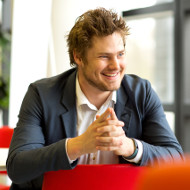
Willem Koeman
The power of Tada is that it is based on principles, so many people agree with it. At the same time, ethical principles are abstract. Yes, we want a digital city from everyone and for everyone. But how do you put that into practice? A lot of work has already gone into Tada’s practical application, for example in partnership with the Municipality of Amsterdam. And now it is time to take the next steps to develop Tada in practice. To that end, we are focusing on more exchange and collaboration between parties that endorse Tada. Willem Koeman of the Amsterdam Economic Board and Aik van Eemeren of Amsterdam’s Chief Technology Office (CTO) talk about the future of Tada in this interview.

Aik van Eemeren
“We recently organized a number of workshops focusing on the future of Tada,” says Koeman, Challenge Lead Digital Connectivity for the Board. “In 2017, Tada initiated a number of meetings. A diverse group of people jointly came up with six principles that should apply to the digital city. In 2018, Tada was included in the Coalition Agreement of Amsterdam. The question now is how to maintain that momentum. What can Tada add here?”
Van Eemeren, Public Tech Lead at the CTO, says: “Other cities look to Amsterdam as a role model. Together with various parties, we defined our shared principles. That is the power of Tada. It is not a municipality-driven initiative; it was created by all the stakeholders in the city. And it is based on intrinsic motivation: what kind of society do we want to be? But there is still a lot of ground to cover in the implementation. It’s not possible to traverse the city anonymously, and more cameras are added every day.”
Exchange of values within the Tada platform
The power of Tada is that it is endorsed by various parties. That power is now harnessed in taking concrete steps towards the ongoing development of Tada principles. Van Eemeren and Koeman describe how Tada wants to operate more as a platform, in which everyone who endorses the Tada principles is a participant. Through mutual collaboration, participants can strengthen each other by applying Tada.
Koeman says, “We took a look at the people who are active in the Tada network and what roles they fulfil. Nine roles were identified, including debaters, entrepreneurs, educaters and policy makers. Then we spotlighted two roles: the entrepreneur and the buyer. On the one hand, you have ethical technology entrepreneurs who offer alternatives to the status quo. On the other, you have purchasers who want to bring in responsible technology. We want to connect these two via the Tada platform, providing an exchange of values within the platform.”
Van Eemeren adds, “Take cartons of milk, for instance. There are various types on the market –fair trade and organic – and that is clearly stated on the carton. Such certification is not available for technology. So, what happens if you are an entrepreneur and you developed a responsible sensor, how do you let people know about that? And what if you are a purchaser and you have decided to include responsible data in your procurement policy? Which product or application would you buy in such a case? Tada has attracted all sorts of people and parties who provide solutions or partial solutions. We want to bring those people together.”
Identifying problems
Koeman explains, “We started investigating the problems that entrepreneurs and purchasers encounter. For entrepreneurs, visibility is a problem. They apply the principles in their products, but how do they show that to the outside world? For purchasers, it is a challenge to find support within the organization. What if the responsible choice might require new systems? The purchase will cost money, and employees will have to brush up on their knowledge. Everything will need to be different, but that does not necessarily make it more efficient, cheaper, faster or easier. That is where the problem lies for both parties. The change will implement another principle: transparency about your data use and ownership, safeguarding social values in your systems. Even if that seems agreeable to everyone, it is the organization that has to pay for it.”
“These are the problems we have identified,” Koeman continues. “And the question is: what can Tada do to facilitate this? We want to use Tada as a platform and bring parties together – for example by involving our network of purchasers, since they are authorized to make procurement decisions. Connected parties can contribute through their background and their knowledge in finding answers. We want to go through the process of finding solutions together. It is a communal challenge that we have to work on together.”
Operationalizing principles in practice
Van Eemeren says, “We want to operationalize and apply the Tada principles. It will help in marketing concrete products and scaling them up. Let’s say you have a product and everyone involved agrees that it is aligned with the Tada principles. The platform will make it possible to showcase the product.”
Koeman explains, “One example is the open source crowd monitor used at Marineterrein. Cameras are used to monitor how busy the site is. The system was developed together with Tada with responsible data use in mind. The images are blurred to ensure that people are anonymized. The video material is only used for counting purposes, and then deleted. It is all well and good that such a system is used at Marineterrein, but how can you bring that to a much bigger context like the Floriade World Horticultural Expo? Then it’s time to take the step to scaling up. You can use the Tada platform to bring parties together.”
The Tada platform will need to be a collective effort, Van Eemeren and Koeman both emphasize. “The beauty of such a platform is that anyone can connect,” Van Eemeren says, “but that is also its weakness, since the platform therefore also lacks ownership.” Koeman adds, “The Board and the Municipality of Amsterdam are facilitating this right now, but we will not be able to make it happen all on our own. Ideally, it will gain momentum and we will reach a point where the Tada platform is supported by the community.”
Photo: Photo Boards on Unsplash.
Translator: Joy Philips
Leave a Reply
You must be logged in to post a comment.